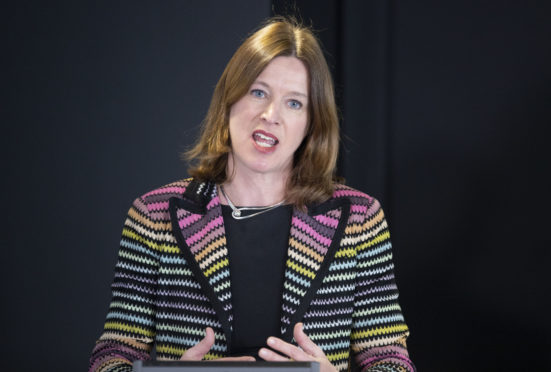They say that a crisis brings out the best and the worst in people and that has certainly been true of the coronavirus outbreak.
For evidence of the latter, look no further than the case of Scotland’s chief medical officer, Dr Catherine Calderwood.
To get an idea of what the Salem witch trials must have been like, watch a repeat of the press conference on Sunday afternoon, during which Calderwood and the first minister, Nicola Sturgeon, attempted to contain the fallout from the doctor’s trips to her second home in Earlsferry, Fife.
The press, of course, were doing their job in holding a public figure to account; the tone of questioning mirrored the growing onslaught of attacks elsewhere.
These came from every direction – on social media, from all opposition parties, from colleagues in the NHS, and from the Scottish Police Federation.
The nation was united for once, but if this consensus reflected the new normal, we should be very worried.
Calderwood, until recently a largely invisible senior doctor, did wrong in ignoring her own advice, of that there is no doubt. She is a woman I have known for several years and I was surprised by her lapse of judgment.
Her relative inexperience of public life may have partly explained her error but it could not save her from scrutiny, as she discovered three days ago.
Even Sturgeon’s dogged attempts to defend her were to no avail once she had become the story and by Sunday night there was no option for this seasoned medic but to quit.
In the new world order – one, it must be said, Calderwood has helped to create – people are either heroes or villains and it is frighteningly easy to find yourself in the wrong camp.
Prince Charles, our 70-something heir to the throne, was in hot water for travelling from London to his Scottish retreat in Deeside while caravans were being turned away from Skye. He was lucky he did not have to endure a press grilling and can’t be sacked.
The Queen, who was driven the 20 or so miles from her London palace to her castle in Windsor, can do no wrong, on the other hand, and neither can her husband, the Duke of Edinburgh, whisked some 130 miles from Sandringham to be with his wife.
Unlike the roaming royals, Calderwood committed the more heinous crime of hypocrisy. She didn’t practise what she preached and, worse, the gap between the practice and the preaching was wide indeed.
Had she been visiting, say, her mother’s lowly care home 44 miles from her Edinburgh pile rather than her second home in a bijou seaside resort would condemnation have been so swift?
However well intentioned, there are grey areas in this quarantine. This is not to let Calderwood off the hook, but her trip to Fife was no more life-threatening than the millions of outings to supermarkets made every day.
In accusing her of endangering lives, the most hysterical of her detractors don’t really mean she personally spread the virus but that she made it more difficult for the social distancing rules to be enforced.
Her jaunts to Fife also put at risk the wider mental health of the whole population, according to some, though how she managed that is not clear.
In ordinary circumstances there might be more sympathy for Calderwood, who has devoted her life to the nation’s health. But these are extraordinary times and the loss of a career pales beside the loss of a life.
The coronavirus measures are in place to avoid overloading the NHS and the statistics suggest they are working. Other countries, notably Sweden, have imposed less stringent controls, which also appear to be slowing the spread of disease.
This country has adapted fast, and mostly with little complaint; however, if we are to emerge with any of our old values intact we should check the escalation in our behaviour from civil obedience to uncivil intolerance.
And that means we must still make allowances for human foibles, even in those leading us through the crisis.
There was an element in the hounding out of Calderwood of making someone pay for our current confinement – and who better than the person who put us there?
She was unfortunate that her curtain twitching neighbours in Earlsferry had nothing better to do, while she worked often seven days a week to help keep them safe, than report her presence to the tabloids.
Now, at the height of this dangerous pandemic that has put the prime minister Boris Johnson in intensive care, we have removed Scotland’s best public health expert from the front line.
Perhaps the pent up frustration of being trapped in a lockdown has been temporarily relieved by this public bloodletting, but who will be next to fall foul of the baying mob?
